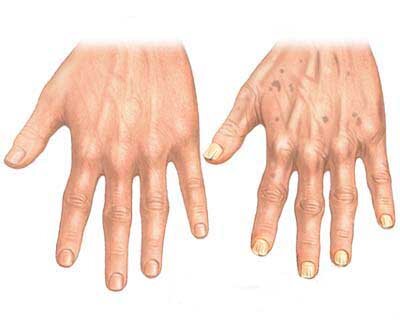Aging Gracelessly

In most role-playing games, the older and more powerful a character gets, the faster they heal, but in real life it's quite the opposite.
In most role-playing games, the older and more powerful a character gets, the faster they heal. As my thirties continue pass me by at roughly 1669 kilometers per hour, I can’t help but reflect that although I’ve clearly gained new levels and spent points on a number of skills over the years, I clearly don’t heal as fast as I did when I was lower level and fifteen years younger. Why don’t games reflect that?
By and large, younger people heal better than older people. Like pretty much every truth in medicine, there are some “buts” and “excepts” that go with that, mostly related to how delicate and breakable babies are, but as a general rule a ten year old will bounce back from an injury faster than a teenager, a teenager heals faster than their parents, and a ninety year old may have wounds that simply seem not to close. This isn’t simply convention wisdom, either, but rather a finding that has been shown to be true particularly for bone healing, and less impressively for muscle tears. With age, people are more likely to contract dangerous illnesses such as pneumonia, and once they contract them, die from them. Elderly cope less well with the trauma of undergoing surgery and recover more slowly after it, in addition to having more wound infections and other complications. The logic has an element of reversibility to it, too; the rate at which a person’s skin wounds heal in adulthood may be an indicator of how fast they age, it being more and more clear to us that some people really do shows signs of aging earlier than others. It must be noted that there are also some exceptions to this; there have been several documented flu outbreaks which seemed to preferentially kill healthy young people in their 20’s, for reasons that we don’t understand, and while looking this up, I also found one study showing that tooth implants seem to work equally well in younger and older adults, so perhaps some body tissues hold up better with time than others.
Obvious, though, it can be difficult to reflect this in game terms. After all, as characters age, they generally become more and more powerful, and I can easily imagine my players getting very annoyed with me if I told them that when they went up a level, they somehow lost hit points instead of gaining them. Going up levels isn’t really the issue, though; in most games that I’ve played in and GMed, players go up several levels per year, let alone per age category.
The core rules of both D&D and Pathfinder incorporate the physical decline of aging… to a degree. Characters lose a tiny amount off of all three physical ability scores, such that a 90 year-old human has lost a total of three point of Constitution, instead of the ten or so points that most centenarians seem to have lost, in my experience. It must be noted that my experience of meeting the elderly is primarily seeing them while they’re sick and/or dying, so it’s possible that I have a biased point of view, but it’s safe to say that most 90 year-olds that you meet would tell you that they’ve lost more than three points of dexterity over the years, once you explained to them what dexterity is in this context and what sort of level of functioning three points might come out to. Granted, there are elderly athletes who remain in adventuring shape well into their later years, and adventurers who receive one or two cure and remove disease spells every year probably generally age a lot better than the average farmer, so perhaps our characters really are still swinging broadswords on the hundredth birthday… but it’s still hard to imagine that they keep getting better and better at taking a punch with every year that passes.
The best way to represent aging might be to reduce hit point and ability damage recovery, as opposed to Constitution per se. Most people really do lose Constitution as they age, hence their greater susceptibility to infection and death, but for many, the real loss is in healing, not global toughness. As per the SRDs, characters regain hit points according to their level when they rest, and this is exactly where aging tends to hit people the hardest. As I said above, of course, no two people physically age at quite the same rate, so it isn’t as simple as saying that healing slows by one hit point per rest per year in the venerable age category or that it takes one extra day to regain ability points for every decade after 40. None the less, this is one aspect of aging that our system’s don’t quite capture in as elegant a way as they might.
More than four years ago, Dr. Eris Lis, M.D., began writing a series of brilliant and informative posts on RPGs through the eyes of a medical professional, and this is the one that appeared here on July 26, 2015. Lis is a physician, gamer, and author of the Skirmisher Publishing LLC OGL sourcebook Insults & Injuries, which is also available for the Pathfinder RPG system.

